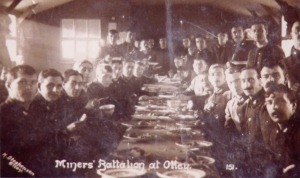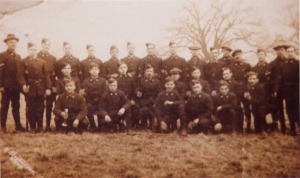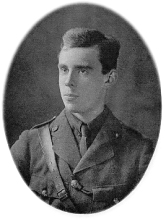
No description of the 1st July 1916 attack on Serre by 31st Division would be complete without mention of the part played by the division's pioneer battalion, the 12th (Service) Bn. (Miners) (Pioneers) King's Own (Yorkshire Light Infantry), known as t'owd twelfth. The battalion's history dates from 5th September 1914 when the War Office authorised the West Yorkshire Coalowners Association to raise a Miners Battalion for the King's Own (Yorkshire Light Infantry). After beginning its life at Leeds, the battalion trained first at Farnley Park, Otley and then at Burton Leonard, near Ripon. By this time it had been allocated to 31st Division as its pioneer battalion. After completing its training in Yorkshire, the battalion moved to Fovant, Salisbury in October 1915 before embarking for Egypt on 6th December. After little more than two months in Egypt, the 12th K.O.Y.L.I. was ordered to France to take part in the planned summer offensive on the Somme.1,2
On the extreme left of the main British attack, the plan for the opening day of the Somme offensive required 94th and 93rd Brigades of 31st Division to capture the hill-top fortress village of Serre. Prior to the attack, five saps (A, B, C, D and E) were dug at intervals along the divisional front, each running from the front line to within 30 or 40 yards of the German lines; one hour before the assault, all the saps were to be opened up. As soon as the infantry were through their first objectives, "B" and "C" Companies of the 12th K.O.Y.L.I. were to start constructing communication trenches leading from the sap heads to the captured German lines. "A" and "C" Companies had been allocated to 94th and 93rd Brigades respectively, their task being to establish strong points at selected positions in the captured German trenches.3,4
The pioneers went into the attack equipped similarly to the assault infantry, the chief difference being that the pioneers also carried a pick or a shovel but only 170 - rather than 220 - rounds of ammunition.2,3 The failure of 31st Division's attack at Serre in the face of overwhelming enemy artillery and machine gun fire is well-known. On the 94th Brigade front, two platoons from "A" Company of the 12th K.O.Y.L.I. followed the 12th York & Lancasters (Sheffield City Battalion) and 11th East Lancashires (Accrington Pals) into the attack; as many as four out of every five men from these two platoons were wounded or killed. Lt. James Stanley Lightfoot Welch lost his life while leading his platoon forward across No Man's Land. In a letter to Welch's father, the 12th K.O.Y.L.I.'s commanding officer, Lt.-Col. E. L. Chambers wrote:
On the front of 93rd Brigade, at least one platoon of "D" Company of the 12th K.O.Y.L.I. suffered heavy casualties on following the 15th West Yorkshires (Leeds Pals) into the attack. Sgt.-Maj. George Cussins, moving forward some minutes later with "B" Coy. of the 16th West Yorkshires (1st Bradford Pals) reported afterwards: "I found in the front line, a good many of the 15th W. Yorks, what was left of the D.L.I. Co. attached to us, also a few of the K.O.Y.L.I."6 In the hours that followed, "B" and "C" Companies of the 12th K.O.Y.L.I., together with the remaining platoons of "A" and "D" Companies "had to rebuild trenches that were crumbling under heavy gunfire, forward supplies of ammunition, dig new trenches, and help in the later hours to save some of the wounded."2 The pioneers reassembled at their assembly posts at 4.30 in the afternoon. 197 officers and men were reported as killed, wounded or missing, though the return of eight missing men on 4th July brought the number of casualties down to 189. Of the events of 1st July 1916, the battalion's War Diary records: "Lts W. H. ROBERTS, H. D. GAUNT and 2nd Lts W. BAIRD, L. FORSDIKE especially showed coolness & energy during the attack 1/7/16. C.S.M. R. E. FREAKES displayed splendid discipline and pluck, & stopped a tendency among a few men to retire, he was assisted by C.Q.M.S. R. KEER who also displayed pluck & energy. Sgt. A. ADAMS was reported by his officer as splendid, though wounded early on."3 Many more deeds of valour must have gone unrecorded in the devastation of No Man's Land.
© Andrew C Jackson 2002 The author is grateful for the help of Major C. M. J. Deedes, and the staff of Wakefield Public Library.
|


